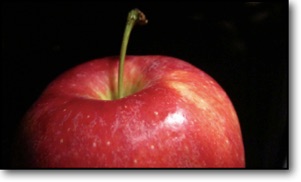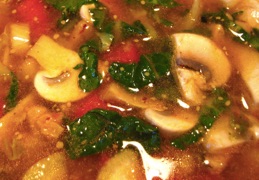

Article

Apples are good "medicine"!
Collected notes from the article:
Review
Apple phytochemicals and their health benefits
Jeanelle Boyer and Rui H Liu, Nutrition Journal 2004, 3:5
http://www.nutritionj.com/content/3/1/5
What's in apples?
Research shows that apples contain COMPOUNDS that help prevent a variety of health problems.
These compounds are called PHYTOCHEMICALS
(phyto = plant – i.e. plant chemicals)
Laboratory studies show phytochemicals in apples:
-
•are potent antioxidants
-
•inhibit cancer cell multiplication
-
•decrease damage to body fats (lipids)
-
•lower cholesterol
Apples and antioxidants
Apples contain antioxidant molecules that help protect the body from damaging free radicals. Free-radical damage is associated with many health issues including cardiovascular disease, premature aging, and cancer.
Dark-coloured peels are especially good sources of antioxidant compounds.
Fruit ordered by antioxidant activity
(most to least)
Cranberry
Apple (red)
Grape
Strawberry
Peach
Lemon
Pear
Banana
Orange
Grapefruit
Pineapple
Boyer and Liu Nutrition Journal 2004 3:5 doi:10.1186/1475-2891-3-5
Apples and Cancer
Eating apples decreases epithelial lung cancer incidence.
Arts I, Hollman P, Mesquita H, Feskens E, Kromhout D: Dietary catechins and epithelial cancer incidence: the Zutphen Elderly Study. Int J Cancer 2001, 92:298-302
Apples (especially the peels) can inhibit the growth of liver and colon cancer cells due to their antioxidant activity
Wolfe K, Wu X, Liu RH: Antioxidant activity of apple peels.
J Agric Food Chem 2003, 51:609-614
Eberhardt M, Lee C, Liu RH: Antioxidant activity of fresh apples. Nature 2000, 405:903-904
NOTE: eat the peels of apples only if the apple is organic!
Apples and cardiovascular disease (CVD)
Eating apples decreases CVD risk in women by 13–22%.
Sesso H, Gaziano JM, Liu S, Buring J: Flavonoid intake and risk of cardiovascular disease in women. Am J Clin Nutr 2003, 77:1400-1408
Apples and asthma
Eating apples reduces asthma incidence (especially with at least 2 apples per week)
Shaheen S, Sterne J, Thompson R, Songhurst C, Margetts B, Buerney P: Dietary antioxidants and asthma in adults- population based case-control study.
Am J Respir Crit Care Med 2001, 164:1823-1828
Apples and diabetes
Eating apples reduces risk of TYPE II diabetes
Knekt P, Kumpulainen J, Jarvinen R, Rissanen H, Heliovaara M, Reunanen A, Hakulinen T, Aromaa A: Flavonoid intake and risk of chronic diseases. Am J Clin Nutr 2002, 76:560-568
Apples: variety and potency
Key beneficial health effects of apples come from compounds called PHENOLICS and FLAVANOIDS.
Apples highest in phenolics:
Fuji, Red delicious, Gala, Libery, Northern Spy
Apples highest in flavanoids:
Fuji, Red delicious, Northern Spy, Fortune, Gala
Apples: storage and potency
Potency of beneficial compounds is NOT significantly affected by storage – even after months.
van der Sluis A, Dekker M, de Jager A, Jongen W: Activity and concentration of polyphenolic antioxidants in apple: effect of cultivar, harvest year, and storage conditions.
J Agri Food Chem 2001, 49:3606-3613
Apples: processing and potency
Processing dramatically reduces beneficial compounds.
Renard C, Baron A, Guyot S, Drilleau J: Interactions between apple cell walls and native apple polyphenols' quantification and some consequences. Int J Biol Macromol 2001, 29:115-125
Apple recommendations:
-
•Eat apples several times per week
-
•Eat a variety of different types of apples
to ensure a variety of beneficial nutrients
-
•Eat deep-red-coloured apples regularly
-
•Limit processed apple products as most of the nutrients will be lost. Apple sauce still has beneficial qualities.
-
•Eat organic apples vs conventional as much as possible to reduce potential pesticide residues
Home | Holistic Nutrition | Talks and workshops | Contact | Articles and recipes

© 2020 Paul Demeda | 2869 Bloor Street West | Toronto, ON M8X 1B3, Canada